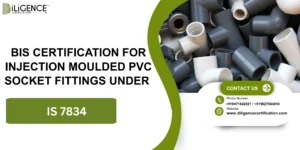



End-to-end certification and regulatory compliance for Indian and global markets.
 BIS Certification
BIS Certification
 CDSCO
CDSCO
 CPCB
CPCB
 LMPC
LMPC
 WPC Approval
WPC Approval
 Global Approvals
Global Approvals
 TEC
TEC
 ARAI
ARAI
 BEE
BEE
 ISO Certification
ISO Certification
 Drone Registration
Drone Registration
 NOC For Steel
NOC For Steel












































Apart from product certification, BIS is responsible for framing Indian Standards, conducting laboratory testing, and ensuring consumer protection.
Some items must be certified before they get released mysteriously made for select goods like cables, switches, cement, gas cylinders, etc.
It ensures electronic products conform to Indian Standards (IS).Covers 70+ products including laptops, phones, adapters, TVs, and batteries.
Hallmarking Certification is mandatory in India for gold and silver jewellery.The BIS 916 Hallmark confirms 22K gold purity.Silver Hallmarking is compulsory for certain grades like BIS 925.
FMCS Mark Certification is a BIS-led approval process that enables foreign manufacturers to sell regulated products in the Indian market.
It helps manufacturers build trust and create a compliance framework. It also markets to eco-conscious consumers.This guide will detail eligibility, provide information on the application procedure, and outline benefits of certification to ISO 14024.
It is governed by NABL under the Quality Council of India (QCI).Accreditation enhances trust among regulators, industries, and global partners.
The World Manufacturer Identity (WMI) is a globally recognized code used to identify vehicle manufacturers. WMI registration ensures traceability, compliance, and global brand recognition for automotive makers.
Stay ahead of regulatory changes with BIS Scheme X Certification. Now extended to September 1, 2026, under the omnibus technical regulation order 2024. Get complete certification support from Diligence Certification.
Get full assistance for CDSCO registration, medical device import licenses, and cosmetic import licenses with Diligence Certifications. Our expert guidance and comprehensive support ensure your compliance, helping you gain a competitive edge in the market. Your satisfaction is our commitment!
Diligence Certifications is a top-tier name in drug licensing and provides topmost service and knowledge support to all sizes of pharmaceutical companies. Our seasoned team understands the global regulations and has seen several success stories.
Having trouble securing Cosmetic License certification in India? Let our ISI certification experts assist you in achieving it and boosting your credibility!
Get expert guidance on Medical Device Registration in India. Learn CDSCO approval process, documents, fees & compliance for manufacturers and importers.
Secure your CPCB Certification with ease and align your business with environmental regulations and sustainable practices. Our expert team streamlines the application process, offering tailored guidance to meet your unique EPR compliance requirements.
Need assistance in Battery Waste Certification? Our experts guide you through every step to ensure smooth and compliant processing.
E-waste has become one of the most serious problems of the modern world, as technology is changing very fast. Discarded electronics items such as smartphones and refrigerators contain very toxic elements hazardous to human health and the environment if not treated properly.
Tyre wastage is an increasing global problem. It threatens to engulf the world in a sea of rubber with disastrous consequences for the environment and human health.
Diligence Certifications help businesses go a long way in environmental compliance matters through their management of plastic waste compliance. It rallies your commitment to reducing environmental impacts, increasing your recycling, driving circular economies and, hence, building credibility with consumers as citizens of a wider world contending against plastic pollution with angels and regulators.
Having trouble in getting EPR registration for your oil products in India? Let the experts do it for you and give credence to your products!
The No-Objection Certificate has special relevance for a business; from needing it while applying for a loan, selling property, or for an application to pursue higher education, there are multiple situations where one has to face the need for an NOC.
Get Full Assistance for Model Approval for Indian W&M Instruments and Importer Registration for Weight and Measurement Instruments with Diligence Certifications. We prioritize your success by providing expert guidance and comprehensive support for all your LMPC Certification needs, helping you gain a competitive edge in the market. Your satisfaction is our commitment, and we work tirelessly to ensure it, now and in the future.
The Diligence Certifications for Packaged Commodities Certification ensures the product conformity with the regulatory requirements. It assesses your product labeling, weight, and quality for compliance with legal requirements and gives transparency and consumer trust. This certification is an instrument of defense against wrong packaging for business and consumers alike and shows your commitment toward fair trading practices and market integrity.
Diligence Certifications offers provision of LMPC Import License Certification under Legal Metrology Packaged Commodities rules with respect to process of importation of goods into India for compliance. Our proficiency ensures that your labeling and packaging for products meet the requirements for easy clearance of goods through customs. It certifies approval from the regulators, having legal backing and gaining confidence of consumers and authorities.
The legal metrology certification is gaining importance in today’s ever-changing context of business with emphasis on fair trade and consumer protection. There is a fresh perspective on maintaining the true measurement and weighing-related activities on account of the fact that with almost every passing day, market growth and transaction complications are assuming greater magnitude.
The company is authorized to undertake the LMPC Manufacturer Registration if it manufactures weights and measures within India. This registration under the Legal Metrology Act guarantees fair and correct transaction laws for business and trade activities through LMPC certificate registration. Let us demystify all the information you would require below.
Get Full Assistance for Non-Network License, Network License, and Equipment Type Approval with Diligence Certifications. We prioritize your success by providing expert guidance and comprehensive support for all your WPC Approval needs, helping you gain a competitive edge in the market. Your satisfaction is our commitment, and we work tirelessly to ensure it, now and in the future.
The Diligence Certifications grant a fast track to the acquisition of WPC Import License, making the imports of communication devices 100% compliant with WPC Certification. Based on our experience and expertise, we ready you for the licensing processes in such a way that your product conforms with all technical standards and is safely usable within India. The certification would guarantee acceptance by regulators, therefore cultivating such trust with the authorities and end users.
Today-connected world, indeed, keeps the promise of wireless devices. Today manufactured devices include laptops, smartphones, portable WiFi hotspots, WiFi extenders, and smart home appliances. However, with this pressing usage, there is a huge demand for safety and performance requirements.
In this hyper-connected age, wireless access points, portable Wi-Fi routers, and other radio frequency (RF) devices are indispensable. When any of these products are manufactured, imported, or sold in India, the knowledge of and acquiring Equipment Type Approval (ETA) becomes imperative; that’s how Diligence Certifications will help you obtain your WPC Certification more conveniently.
In today’s world with increasing environmental consciousness, it is vital to dispose of equipment properly after the intended lifetime. Targeting hazardous e-waste is one of the vital roles played by RoHS; elaborately explaining RoHS certification itself, RoHS objectives, substances involved, certification processes, and applicability in curbing environmental contamination.
Diligence Certifications provides UL (Underwriters Laboratories) Certification services to ensure your products comply with rigorous safety and performance standards. Our skilled team supports you throughout the certification process, ensuring full adherence to UL requirements. Achieving UL certification with us boosts your product’s credibility, fosters consumer confidence, and highlights your dedication to safety and quality in the market.
KC Certification is a major mandatory condition for many products that are developed to reach Korea’s genuine profitable consuming market. KC Certification is otherwise known as KC Registration or simply the Korean Certificate, and denotes compliance with Korean safety standards and regulations.
Struggling with FCC certification in India? Our expert team at Diligence Certifications can help you navigate the process effortlessly, ensuring your electronic devices meet all compliance standards. Boost your credibility and market access with FCC certification today!
Among these is the CE Marking, which is especially pertinent to manufacturers who are considering selling their products in the European Economic Area (EEA).
The SAFTA certificate online enables reduced customs duties under the SAARC trade agreement.Businesses can apply for a SAFTA certificate digitally through authorised agencies in India.This document is vital for proving origin and unlocking tariff benefits.
You can apply online for your MSDS Certificate in India through many trusted compliance and safety services.This documentation allows the company to maintain regulatory safety and hazard management which also protects the world you operate in.
SALEEM / SABER system is the online conformity platform linking exporters, certification bodies, and customs.Two stages: Product CoC (PCoC, valid one year) and Shipment CoC (SCoC, per consignment).
It replaces the CE marking post-Brexit and is mandatory for most regulated products.Indian manufacturers exporting to the UK need UKCA marking to stay compliant.
Get Full Assistance for TEC Type Approval, TEC Interface Approval, TEC Certification Approval and TEC Approval of Technology with Diligence Certifications. We prioritize your success by providing expert guidance and comprehensive support for all your TEC Approval needs, helping you gain a competitive edge in the telecommunications market. Your satisfaction is our commitment, and we are dedicated to ensuring it now and in the future.
Get full assistance for ARAI Vehicle Certification for vehicles, engines, and components with Diligence Certifications. With over 25 years of experience, we prioritize your success in gaining a competitive edge in the automotive market. Trust our expert guidance for all your ARAI certification needs.
Having trouble securing BEE Star Rating Certification in India? Let our ISI certification experts assist you in achieving it and boosting your credibility!
It is critical to understand how to get ISO Certification for audit and compliance purposes.Read on to learn step-by-step how to get ISO certified in India with expert assistance.
End-to-end certification and regulatory compliance for Indian and global markets.
 Business Registration
Business Registration

















End-to-end certification and regulatory compliance for Indian and global markets.
 Legal Services
Legal Services
 Trademark Registration
Trademark Registration
 Copyright Registration
Copyright Registration
 Patent Registration
Patent Registration






















































Property leasing is one of the most common arrangements in India, whether for residential, commercial, or industrial purposes. A lease deed serves as the legal foundation of this arrangement, establishing the rights, duties, and liabilities of both landlord (lessor) and tenant (lessee).
Rajesh, a landlord from Delhi, thought a simple rental agreement would suffice. His tenant vacated six months early, cheques bounced, and the ₹10 lakh arrears became a legal nightmare. The agreement lacked a termination clause—an oversight in lease agreement drafting. Rajesh’s story is not unique. Across India, countless landlords and tenants face disputes because their contracts aren’t watertight. Proper drafting lease agreements is more than paperwork—it is legal protection, financial clarity, and peace of mind. This article brings together law, practice, and real experiences to help you create strong rental property agreements.
A lease deed is a written legal agreement between a property owner (lessor) and a tenant (lessee), whereby the lessor grants the right to use the property for a defined period in return for consideration, usually rent.
The deed outlines:
In India, under the Transfer of Property Act, 1882, a lease is considered a transfer of a right to enjoy property, for consideration, for a specified time, express or implied.

A valid lease deed must contain the following elements:
A lease only grants use, not ownership—precisely why lease agreement drafting must clarify rights.
The Transfer of Property Act (ToPA) under Section 105 defines a lease as a transfer of the right to enjoy property for a certain time, in exchange for rent. Any lease agreement drafting must align with this provision to ensure legality.
Under Section 17 of the Registration Act, leases longer than 11 months must be registered. Failure invalidates the lease in court. Stamp Duty varies across states and is mandatory for enforceability. See BIS guidelines.
States like Maharashtra, Karnataka, and Delhi have Rent Control Acts governing rent increases and eviction. Ignoring these can render even the best-drafted lease unenforceable.
Lease agreements can be categorised based on purpose and duration:
Every lease deed includes specific clauses for clarity and protection. Key terms are:
These clauses eliminate ambiguity and reduce chances of disputes.
A lease deed is not simply signed—it passes through several structured stages:
Parties discuss key aspects—rent, deposit, duration, insurance, repairs—before finalising.
Terms are recorded in an Agreement to Lease or MoU, reflecting mutual intent.
Tenant verifies landlord’s ownership through:
Lease deed is drafted incorporating agreed terms. Stamp duty is paid as per the State Stamp Act, and rates vary across India.
Lease deed is signed by both parties in presence of two witnesses and registered with the Sub-Registrar of Assurance.
Tenant informs authorities and applies for relevant licences (particularly for commercial/industrial use).
A lease deed is more than a mere agreement—it is the backbone of any landlord-tenant relationship. By clearly defining rights, responsibilities, and remedies, it prevents disputes and provides legal protection to both sides.
Whether you are leasing a home, office, shop, or factory, it is strongly advised to:
With proper documentation, both lessor and lessee can enjoy a secure, transparent, and mutually beneficial lease arrangement.






















A lease deed is a legal contract where a landlord gives a tenant the right to use property for a fixed time in exchange for rent.
Yes, leases longer than 11 months must be registered under the Registration Act, 1908, for legal validity.
A lease is long-term and registered, while a rent agreement is short-term (usually 11 months) and more flexible.
It depends on mutual agreement, but tenants often bear the costs; rules vary by state.
Unregistered deeds beyond 11 months are invalid in court and treated as month-to-month tenancies.
Landlords must provide possession, maintain structural safety, and return deposits after tenancy ends.
Tenants must pay rent on time, maintain property, and use it only for the agreed purpose.
Yes, through a termination clause or mutual consent, with prior written notice as agreed.
It is an advance paid by the tenant, refundable after lawful deductions at tenancy end.
It is the minimum period during which neither party can terminate the lease prematurely.
Yes, leases often include periodic rent hikes, commonly 5–10% annually or every few years.
Disputes are usually resolved through arbitration or courts, depending on the deed’s terms.

